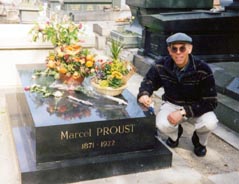
The first gathering of the American contingent of the ARL German Resource Group as a group was gradual, gathering one by one around 1:00 p.m. in the entrance hall of the Göttingen train station and proceeding by bus to the Werner Schule, a training facility of the German Red Cross. CPR training was not offered, but a library tour was arranged for the same day. Since most had just arrived on the scene with multiple jet-lag symptoms, inevitable tiredness of flesh subjected to abnormal time differences was a first obstacle.

The library tour included elements of library architecture, of heating and cooling specifications, of a mixed closed- and open-stack system unique to Germany, of hands-on trials of their compact shelving, of periodical availability, of remote storage, etc. etc. There were a number of comparative and contrastive points of German vs. American librarianship that could be instructively noted.
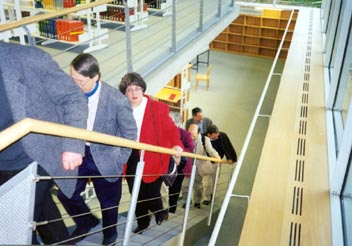
We were next treated to a tour of the town itself, which presented in context a number of historical facts about the town, the various princes and kings and emperors, and the specifics of the university. Of particular interest were various buildings in which famous people had studied and discovered famous things (chief among whom and which was Professor Gauss, whose image still resides on the German 10-Mark bill and who invented the concept of the "bell curve" that is so often misapplied while grading students). At one point, as the group began walking along what remains of the city wall, Hacken couldn't prevent himself from reminding those present of Heinrich Heine's quote that Göttingen had become famous "for its sausages and its university," and that the sausages had been mentioned first. The tour guide then took us to the sausage part of town. We also saw an Audi Max, but it was permanently parked.
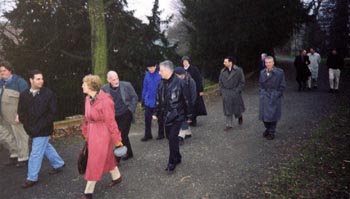
The next morning, bright and early (9:00 a.m. is bright and early to me), we were given a tour and presentation of the Göttinger Digitalisierunszentrum (Göttingen Digitization Center), of particular use and interest to me as webmaster of EuroDocs and other cyberdocument pages. Among the things I learned (or at least was told) was that in this center they are set up to scan 250 pages an hour, that metadata cataloging takes approximately 15 minutes per cyberitem, and that, very importantly, optical character full-text recognition of Fraktur (German Gothic script) is not yet possible (I'll keep close tabs on the progress of this, since so many German texts from the early 20th century backward are in that print format). Among the ongoing projects of this center are, of course, specialities of the local holdings: the mathematical works and materials of Gauss, travel books of North America (since Göttingen has a collecting priority of American history and literature, one reason they may have been eager to have American librarians visit), Goethe illustrations, and a full run (1783-1822) of the local historical journal with more than local interest, the Göttingische Gelehrte Anzeigen. Further details were given of funding, conversion processes, metadata construction and administration, document management systems and online access, along with information on the Minolta PS 7000 scanner to which they were upgrading, with examples of cropping, zooming, editing, software types, book cradles, camera positions, and other facts delivered with true Germanic thoroughness.
As a counterweight to all the cyberstuff, we also were introduced to the local collection of German incunabula and early printing, augmented with a collecting emphasis on the 18th century.
It's worth mentioning that where North America took the Farmington Plan and dropped it, the German libraries have carefully developed the idea and the practice of distributed collecting (with significant funding help from the German Research Council), so that specific German libraries are now identified with various centuries and with relatively narrow geographical and disciplinary foci. When a researcher wishes to study German literature in depth, for example, he or she knows that the university library at Frankfurt is the best place to go; for American literature of the 18th century (and 19th), Göttingen is the place, etc. Part of the joint work between German and American librarians will be to develop complementary relationships between complementary collections, on the one hand, and to publicize which collections in the United States are strong in which areas.
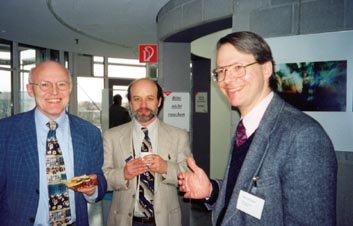
The afternoon of the second day, after the formal plenary session and introductions of the German and the American colleagues, time was devoted to break-out sessions of the four working groups of the ARL German Resources Project:
Bibliographic Control,
Document Delivery,
Collection Development, and
Digital Libraries.
As a member of the latter work group, the DLWG, Digital Libraries Working Group, I can report on that meeting. Two languages were used in discussions, each using his or her own, though everyone present understood both.
The first valuable breakthrough, in my mind, following the inevitable fluff and circling, was the drafting of a mission statement. I had sent a trial mission statement to the group's listserve before the meetings, and it was changed in some particulars to result in the following:
The Digital Libraries Working Group encourages and fosters the digitization of important research-oriented materials to be made broadly available to the world via the Internet. Among this group's tasks is to assist in the funding and completion of such digital collections, while agreeing on standards for interoperability, metadata, and identifying useful items/collections.
There are certain things noticeable here: the limitation is not to "German Studies" or "American Studies," and CD-ROM access is given no mention. This is all still pending.
As a group, we also need to coordinate or even subordinate if necessary with any other digital projects that share similar goals. One such group being contacted is the Digital Library Federation.
Another important step at the meeting was the concept of an online clearinghouse for digital projects. This will be a well-advertised website at which German and American project participants (and perhaps extending to international participation at some point--Japanese librarians have already expressed interest) will be able to see which themes are preferred, which projects are possible, potential, planned or completed, which resources are available, which colleagues to contact, etc.
Technical standards, mercifully as far as I'm concerned, were discussed at a minimum for now, only with the proviso that "full information capture" will be the goal, with further specification of XML language and Dublin Core minimum metadata standards to follow. It was decided that the language of the work would determine the language of the metadata, something I need to think about more, since German keywords won't necessarily always help an English-speaking clientele interested in a German document...
A subcommittee was assigned to collect existing sites, another for the clearinghouse, another for copyright questions, another for identifying themes (whether large or small). I volunteered for the "themes" subcommittee, an area I feel is crucial to the success of the project. At the same time, though, more work needs to be done (perhaps) on "how to measure demand," something that is closely related to choices of themes...
I felt very encouraged by the potential of this working group, though much is still in flux and has but mere nuances of potential. The future will tell if the work of the group can bear fruit.
On the third day, a final plenary session was held with all participants (whoops, that's redundant: plenary means everybody). The leaders of the four working groups reported on what had resulted from their meetings:
Digital Libraries Working Group: see my above remarks.
Collection Development Working Group: This group would like to work on listing North American equivalents to the "Sondersammelgebiete" (Special Collecting Areas) of the German libraries as a means to make cooperation possible on an ad-hoc basis from one institution to the next as well as for coordinated projects. One means for this may be the shelf-list count statistics of ARL. The group is also interested in monitoring the Harrassowitz database of non-purchased monographs for North America, to see where it may lead us. They would also like to keep in contact with other working groups, e.g. for thematic concerns with the digital libraries group.
Bibliographic Control Working Group: The ultimate goal of this group is to harmonize fields and records between the German and American standards. For now, the group is working with the records of the Deutsche Bibliothek to see how they can be used and edited for local needs. A translation of AACR2 into German is being guided by the group and others. They want to set up a website of cataloging tools useful for German and American catalogers. They will follow the CORC project for metadata being carried out at OCLC.
Document Delivery Working Group: This is the group with the best possibility for immediate results. A pilot project GBV Direct/North America is being tried, in which German materials are loaned to American libraries. Depending on results, this could be opened to more ARL libraries. Göttingen agreed to lend returnables to North American libraries, though this is of less interest because their special collection areas are probably already well represented in the USA. Of more interest were the spontaneous utterances of the library directors of Tübingen (theology) and Frankfurt (German language and literature) that they were willing to join the GBV Direct program to loan materials to North America. The next question for each North American library: how and when can we benefit from this program?
With handshakes and exchanged e-mail addresses and a sandwich or two washed down by mineral water, the group parted, each unto his or her own city (eventually).
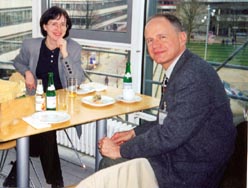
The time schedule now looks as follows: The ARL German Resources Project, the American contingent of it at any rate, will assemble again at the New Orleans ALA Conference to give reports on progress. Then, with luck and funding for the Germans, the German and American groups will again assemble at the Winter ALA in San Antonio (January, 2000). Funding is an ongoing concern, since seed money was given by the Mellon Foundation to help with the meeting in Göttingen, but that is now history. Preliminary talks are being held with the Bertelsmann Foundation (Bertelsmann is the German giant that owns Random House and other publishers world-wide) to see if they might support the effort. The German Research Council (of whom a representative was in the meetings I attended) has expressed willingness to contribute to the initiatives if American matching funds can be found.
The American librarians climbed aboard a bus for a day tour which showed a good profile of the former East Germany as we traveled to Leipzig. One stop was at a huge symbolic historic panorama painting of note in the Harz mountains, not far from Kyffhäuser Mountain where, legend has it, Emperor Friedrich Barbarossa (of medieval lore) still sleeps deep within a cave, his beard growing ever longer, and he will burst forth to aid the German nation when she needs it most. She must not have needed him yet, because he's still in that cave.
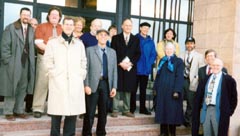
A special stop was arranged in the city of Halle, where the legendary bibliographer Paul Raabe (a name I first heard whispered with reverence in graduate school), now in his 80's, showed us around the holdings of the library of the Frankesche Stiftung, a foundation that started as an orphanage in previous centuries and has developed schools and libraries and other educational wonders. It was a beautiful but cold starlit night, and the library was astonishingly rich in old holdings that we were allowed to browse as the history and vicissitudes of the institution under Socialism were related.
We found our hotel in Leipzig: the Lindner Business Aktiv Hotel. Nicht nur besser. Anders. Anxious to surf the web back to my e-mail, I purchased an hour or two of Web-TV and was somewhat disappointed in its primitiveness. (A primitiveness that has to be attributed to the American software rather than the hotel's hardware.)
The next day was devoted to a conference of European librarians discussing digital initiatives in Leipzig, all in connection with the annual Leipzig book fair. A CD-ROM was available that tells about the programs of the European Union under the program: Telematics for Libraries." We listened to speakers, some of them highly interesting, some not, in German and English. Prof. Bob Fryer from Southampton entertained as he discussed "Scientific Knowledge in the Public Domain" with a series of anecdotes and jokes. Others mentioned something about "Digital Tradition," surely a neo-anachronism or a contradiction in terms; I think they meant "cultural tradition as it is being stored digitally." The main man for the Germans was the Federal Secretary for Culture, and his presentation was more intellectual and meaty than I would expect from an American cabinet member: he quoted Jorge Luis Borges--who had written about the Library of Babel--and said that this Library of Babel was now going to appear in digital form. (Do we even have the equivalent of a Secretary for Culture? Maybe the Secretary of Health, Education and Welfare?) Another productive time for me was at the buffet lunch, speaking with library directors and eating currant pudding with vanilla sauce.
The following days were devoted to the Leipzig book fair, unique and different from the Frankfurt book fair in that (a) it emphasizes German book production, whereas Frankfurt covers the world and (b) it accentuates the relationships, bibliographic and otherwise, with Eastern European countries, a tradition begun with the German Democratic Republic but still continued. The country of emphasis was Bulgaria this year, but the topic on everybody's lips was, of course, Kosovo and Serbia. Bombs were dropping a mere few hundred miles from our civilized book discussions. Among the companies contacted, mainly as a group of Americans, were some digital publishers, from whom we'd like to coax special consortial rates.
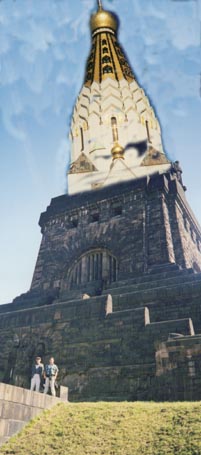
On Friday of that book fair week, further German-American networking took place, this time with an even smaller (select?) group of librarians. This took place in the University of Leipzig library, not 20 metres from where I had gathered bibliographic information for Deutsche Dichterhandschriften des Poetischen Realismus, (the web reference tool that lists locations of German 19th-century literary papers) during a 1992 visit. Since that time, the bombed-out reading room (left bombed out since WWII by the East German government) has been restored in magnificent fashion. But back to the meeting: librarians from the former East, from Leipzig, Erfurt, Jena and Halle, told us of their projects and we reiterated what we had discussed in Göttingen. The size of the group made for good conversations, which continued afterward. CD-ROMs were distributed from various libraries (the latest thing in calling cards, it seems), one of which from the Technical College of Leipzig was entitled "Goodies" and contains a virtual tour of the library, video of a graduation ceremony, research reports, demos, more than I ever wanted to know about that particular institution.
In the afternoon, we were given a tour of the Leipzig edifice of the Deutsche Bücherei, sister institution to the Frankfurt Deutsche Bibliothek, both of which are depository libraries for all German publications, but both of which also collect more. I learned (for the first time, I must admit) that all Austrian and Swiss titles cataloged by the Deutsche Bibliothek are actually cataloged in Leipzig, and this bit of trivia might come in handy some day, since I took down the names of contact people. "Contact" can be a verb, so it's only appropriate that this report should enter with those two words: "contact people."
